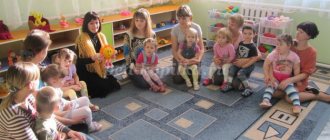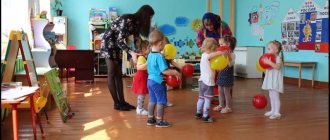| № | Form of work | Contents of the activity | Target |
| Throughout the academic year |
| 1. | Maintaining the section “Specialist Advice” | Consultations with a teacher - psychologist, speech therapist, music director, physical education instructor. | Information support for parents on educational issues. |
| 2 | Maintaining the permanent exhibition “Very Skillful Hands” | During the school year, the exhibition is replenished with works of artistic and creative children in visual arts, modeling and appliqué. | Organization of work to create conditions for interaction between teachers and parents of students through exhibition activities. Increase children's interest in the subject of the exhibition. |
| 3 | "Feedback with parents" | Maintaining a parent group in Viber | Providing productive feedback to parents, prompt interaction. |
| 4 | Photo exhibition "What do we live for" | Posting photos in a group from various events where children participate | Demonstration of the active activities of children in kindergarten, their skills and abilities. |
| 5. | Cooperation with the group's Parent Committee | Solving operational issues and problems of the group | Creating a democratic way of cooperation |
| September |
| 1. | Organizational parent meeting "Let's get to know each other." | 1. Clarification of the families’ social passport data, information about parents (filling out the notebook “Information about parents”). 2. Introducing parents to educational goals for the current school year. 3. Familiarization with the age characteristics of children 2-3 years of age. 4. Questionnaire “Parents’ educational requests for the school year”, “About the development of your child’s speech.” 5. Issues of parental participation in group and kindergarten activities. 6. Selection of the parent committee of the group. 7. Guidelines for parents: “Magic fingers”; 8. Consultation for parents “Finger games: what are they?” | Rallying parents, setting common goals, planning joint activities for the school year. |
| 2. | Consultation for parents: “Adaptation of children to kindergarten conditions.” | Provide pedagogical education to parents in the following areas: · developmental features of children 3 years of age; · creating optimal conditions for the child, facilitating a comfortable stay in the children's group. Preparing a memo for parents. | Helping the child and parents in the process of adaptation to kindergarten |
| 3. | Consultation: “Daily routine and its importance in a child’s life.” | Provide pedagogical education to parents on the need for a daily routine in a child’s life | Formation of a unified approach to maintaining a daily routine. |
| 4. | Poster consultation on traffic rules “Child on the road” | Remind parents to follow traffic rules, use child seats and restraint belts | Identification of parents' knowledge on the topic of compliance with traffic rules. |
| 5. | Memos for parents: "Adaptation to kindergarten" "Features of development of young children", “What a 2-3 year old child should be able to do.” | Explain to parents the importance of the adaptation period in kindergarten, reveal the developmental features of an early child. | Informing parents about the importance of certain issues related to young children |
| 6. | Mobile folder “What a 2-3 year old child should know” | Creation of a visual information stand in the form of a sliding folder, on the issues of the child’s necessary developed knowledge and skills | Introducing parents to the psychological and age characteristics of children. |
| 7. | Folder “How to dress a child in autumn” | Creation of a visual information stand in the form of a mobile folder on the issue of how to properly dress a child in the autumn | Introducing parents to the peculiarities of dressing a child in autumn weather |
| 7. | Filling out the notebook “Information about parents” | Collecting the necessary information about parents, identifying the characteristics of relationships in families | Ensuring prompt communication with parents and providing up-to-date information. |
| October |
| 1. | Memo “What to do if your child bites others” | Explain to parents how to act in this situation | Providing theoretical assistance in raising a child |
| 2. | Memo “Why you shouldn’t hit a child” | Explain to parents how to act in this situation | Providing theoretical assistance in raising a child |
| 3. | Poster consultation “Health is the head of everything” | Form the right attitude towards health through visual information | Formation of a unified approach to preserving and strengthening children’s health |
| 4. | Exhibition of crafts made from natural materials “Gifts of Autumn” | Hold an exhibition of crafts made from natural materials on the theme of autumn. Children do the work together with their parents. | Activating the involvement of parents in the interests and needs of the child, developing creative interaction between children and parents. |
| 5. | Individual consultations “Whims and stubbornness” | Individual assistance to parents regarding the whims and stubbornness of children (together with a teacher-psychologist upon request) | Providing theoretical assistance in raising a child. |
| 6. | Consultation: “Cultural and hygienic skills of children” | Conducting consultations with parents that are advisory in nature on the issue of developing cultural and hygienic skills in children | Assistance in the development of cultural and hygienic skills of children |
| 7. | Consultation for parents “Development of fine motor skills in preschool children.” | Conducting consultations with parents, which are advisory in nature on the development of fine motor skills. | Consideration of the issue concerning the development of sensory-motor functions of a young child |
| 8. | Recommendations for parents “Outdoor games” | Provide recommendations for parents on the issue of outdoor games | Helping parents organize outdoor games with children |
| November |
| 1. | Conversation “Dressing for the weather” | Remind parents to dress appropriately for the weather to avoid colds | Assisting parents with the correct selection of clothing in preschool educational institutions |
| 2. | Poster consultation “Developing independence and self-service skills.” | Selection and systematization of information, understandable and concise, concerning issues of education of independence. | Assisting parents in developing independence and self-care skills |
| 3. | Design of the “Safety Rules” stand | Selection of information on child safety and its presentation in the form of a stand | Providing theoretical assistance to parents on safety issues |
| 4. | November 29 is Mother's Day. Photo exhibition “My beloved mother” | Collecting photographs of mothers or children with mothers and organizing a photo exhibition | Strengthening the bond between parents and children |
| 5. | Individual conversation with parents “The need for flu vaccination” | Find out the attitude of parents towards the issue of vaccinating children against influenza. Explain the importance of this issue. | Informing parents about the importance of vaccinations |
| 6. | Consultations at the information stand: “Why should children be speech finger games?”, “How to conduct speech games with a child finger games." | Conducting poster consultations on the issue of finger games. | Considering an issue with parents regarding speech finger games |
| December |
| 1. | Parents' meeting - round table "The relationship between the speech and intellectual development of a young child" | Results of the adaptation period (together with a teacher-psychologist) Organizing a productive conversation on the topic, sharing experiences. Showing practical ways to organize a developmental environment at home. | Increasing the competence of parents in matters of child development, practicing practical skills when organizing educational games at home |
| 2. | Reminders: “Children’s clothing for walks”, “What is the danger of ice”, “Rules of behavior on the street in winter”, “Games and fun in winter” | Placing information on the rules of behavior in winter at the stand for parents. | Theoretical introduction to parents |
| 3. | Poster consultation: “Our habits are the habits of our children” | Convey to parents that children reflect the life and behavior of their parents, and that they need to form good habits in children, preferably by example | Theoretical information for parents |
| 4. | Consultation: “What to do with your child at home during the holidays?” | Provide parents with recommendations for spending time with their children at home. | Theoretical information for parents |
| 5. | New Year's Crafts Competition "New Year's Miracle" | Doing creative work with parents on a New Year's theme | Interaction and cohesion between parents and children |
| 6. | New Year's party | Demonstration of creative activity of parents and children when organizing a holiday | Interaction and cohesion between parents and children |
| 7. | Consultation for parents on the topic: “How to protect your child from injury while walking in the winter season” | Conducting consultations for parents regarding the issue of injuries on the street during a walk in winter. | Explaining to parents the issues of injuries while walking in the winter and how to avoid it |
| January |
| 1. | January 11 - World "Thank You" Day - collective production of the folder "Everything about politeness" (proverbs, poems, riddles). | Collecting the necessary information, including folklore about politeness, making a folder. | Formation of politeness in children through the use of folklore and personal example of parents |
| 2. | Written consultation “Vitamin ABC” | Conduct a consultation with parents on the topic: what vitamins are there and which ones are especially necessary for children | Theoretical information for parents on the issue of essential vitamins for the child’s body |
| 3. | Memo for parents “How to dress a child in winter” | Inform parents how to properly dress their child in winter | Theoretical introduction to parents |
| 4. | Individual conversations “The magic of kind words” | Encourage the desire of parents to cultivate in their children a sensitive, friendly attitude towards others. | Individual counseling for parents on politeness issues |
| 5. | Poster consultation “Why do children break toys?” | Explain to parents why children break toys | Theoretical information for parents |
| 6. | Folder-moving “Games for the whole family” | Collecting all kinds of games for young children and creating a methodological folder for parents | Informing parents about the importance of games, their meaning, selection by age, holding games. |
| 7. | Folder – moving “The role of finger games in the development of your child’s speech” | Creation of a sliding folder on the issue of finger games for clarity of information | Visually informing parents about the importance and influence of finger games on the development of the child |
| February |
| 1. | Poster consultation “The role of the father in raising children” | Consulting parents on the importance and necessity of father participation in the child’s life | Consulting parents on the importance of the father in raising children |
| 2. | Memo “How to teach a child to be friends” | A visual aid for parents, with accessible and concise information on the topic: “How to teach a child to be friends” | encourage the desire of parents to cultivate in their children a sensitive, benevolent attitude towards others. |
| 3. | Consultation - booklet “The influence of the psychological microclimate of the family on the health of the child” | Conducting consultations on the importance of the family’s psychological climate and its impact on the child’s health | To direct parents to active, joint and pedagogical correct work in raising children in the family. |
| 4. | Photo exhibition “What are our dads like?” | Collecting photographs of dads and organizing a photo exhibition | Strengthening the bond between child and father |
| 5. | Consultation-workshop “Development of fine motor skills” | Placement of theoretical information on the development of fine motor skills in young children on a stand at parents' stands | formation of ideas among parents that the development of fine motor skills of the hands stimulates the mental and speech development of children. |
| 6. | Individual conversations with parents of poorly speaking children: “Creative finger games: using sand, plasticine, paints,” “We develop fine motor skills of the fingers through self-massage” | Conducting individual conversations with parents of those children who speak poorly on the issue of finger games for the purpose of children's speech development. | Explaining to parents of low-speaking children the importance of using creative finger games to develop speech |
| March |
| 1. | Wall newspaper “We are mother’s helpers” | Design of a festive wall newspaper for mothers and grandmothers dedicated to the holiday of March 8 | Instill in children a sensitive and friendly attitude towards loved ones. Cultivate a desire to do good deeds. |
| 2. | Poster consultation for parents “Whims and aggression” (together with a teacher-psychologist) | Consulting parents on how to cope with whims and aggression in children | Theoretical awareness of parents on the issues of whims and aggression of children |
| 3. | Holiday “Our Grandmothers and Mothers” | Celebrating a holiday for mothers and grandmothers | Strengthening cooperation between parents and educators. Instill in children a sensitive and friendly attitude towards loved ones. |
| 4. | Individual conversations “Can, can’t, must” | Individual assistance to parents in questions: what is possible, what is not, and what is necessary. | Theoretical introduction to parents |
| 5. | Parent workshop on the topic: “Game in the life of a preschooler” | Conducting a planned parent meeting, in the form of a workshop, on the topic of play and its necessity in the life of a preschooler. | Discussion of issues related to the play activities of a young child, increasing parental competence. |
| 6. | Memo: “Child’s health and computer” | Creating a theoretical reminder on the issue of child health and the influence of various gadgets on him | Theoretical information for parents |
| April |
| 1. | Poster consultation “How to prevent vitamin deficiency in spring” | Theoretical awareness of parents on the question: “How to avoid vitamin deficiency?” | Theoretical information for parents on the issue of essential vitamins for the child’s body |
| 2. | Competition of creative family works "World of Space" | Creation of creative works together with parents dedicated to “Cosmonautics Day”. Organization of a thematic competition | Interaction and establishment of a close relationship between parents and children |
| 3. | Folder – moving “First Aid” | Development of a methodological folder on first aid | Creating visual information on first aid |
| 4. | Photo - exhibition “Walking is great!” | Collecting photographs from a walk between parents and children and organizing a thematic photo exhibition | Helping parents maintain and strengthen the physical and psychological health of their children. |
| 5. | Master class “Our fingers play” | Conducting a master class for parents, what their children learned | Demonstration to parents of both children’s skills and failing moments |
| May |
| 1. | Memo “Safety measures on the street in the summer” | Placement of theoretical information on the issue of children's safety in summer in the parent's corner | Theoretical information to parents on safety issues in summer |
| 2. | Conversation “What kind of work is available to children?” | Conversation with parents about how important work is for children and what is available in early preschool age | Theoretical introduction to parents |
| 3. | Together with parents: preparing play materials and landscaping the area for the summer season. | Together with parents, collecting and creating the playing materials necessary for children of the 1st junior group, as well as landscaping and landscaping the group’s area | Interaction between the kindergarten and parents, assistance in enriching play material and landscaping the area |
| 4. | Consultation “Children’s health in the summer.” | Consulting parents on the proper health of children in the summer | Theoretical introduction to parents |
| 5. | Parents' meeting "Successes and achievements of children of the first junior group" | Conducting a final parent meeting, summing up the results of the school year, discussing important current issues. Planning a summer wellness period. | Discussing the progress of young children with parents |
| 6. | Information stand “Books in our home” | Creation of an information stand of a recommendatory nature - “What books should children read?” | offering recommendations to promote the development of children's interest in reading. |
| 7. | Visually themed stand “Echoes of War” | Creation of a thematic stand dedicated to May 9th. | Nurturing civic-patriotic feelings and developing a sense of pride in the heroism of the people |
| 8. | Movable folder: “Games and exercises for our fingers” (for repetition and learning at home) | Creation of a folder - movement, on the issue of accessibility of finger games and exercises for parents | Creation of visual methodological support on the issue of finger games |
| 9. | Conversation with parents: “How did this work influence the child’s development?” | Organizing a conversation with parents on the impact of the work done over the year on the child’s development | Consideration of the impact of the work done on the child. |
| 10. | Memo “A walk in the fresh air is the key to health!” | Creating a memo for parents on organizing a walk in the fresh air | Theoretical reminder to parents about organizing outdoor walks |
| 11. | Questioning parents on the topic “Organizing walks with children” | Conduct a survey of parents on the issue of organizing walks with young children | Theoretical introduction to parents |


